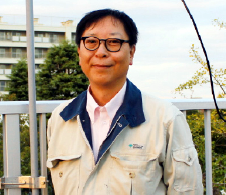- Notice
The fun of research is conveyed by the way the teacher enjoys research
2013.10.22
Tokyo Metropolitan Technical High School Yoshiaki Fujita, Ph.
Established seven years ago, the Tokyo Metropolitan Technical High School has been conducting research on issues in its classes for the past five years and has been actively presenting its research. The school's research results have been highly acclaimed, including winning the Tokyo University of Science's Bo-chan Science Award (an essay contest and research paper presentation opportunity for high school students sponsored by the university) for three consecutive years. How was this environment created? We interviewed Professor Yoshiaki Fujiyoshi, who provides guidance to the students.

University method for determining research topics
The research project is a required course for third-year students, and each of the nine teachers in charge of third-year students has one or two research themes, and students begin research on the theme they are most interested in. The teachers are all assigned one or two research themes, and students begin their research on the theme they are most interested in. The teachers themselves have their own research themes, and the students choose their own themes and conduct their own research, just as they would at a university.
Involving students in the teacher's hobbies
The research theme of Professor Fujiyoshi, who teaches in the Department of Electrical Information Design, is "radio wave observation of meteors. The plasma produced when meteors enter the atmosphere has the property of reflecting radio waves. The reflected radio waves are caught by a Yagi antenna on the roof of the school, and are automatically recorded on a computer 24 hours a day. Students extract data from the computer once a week in class, compile data on how many meteors were observed and at what time using spreadsheet software, and compare it with data on seasonal meteor showers.
In fact, this theme was not prepared for a research project, but rather a hobby of his since his junior high school days. In elementary school, he became interested in astronomical objects and observed them through a telescope, but he was strongly attracted to meteor observations, which could also be seen with the naked eye. It was a natural progression for him to become a teacher and begin radio wave observations of meteors as the theme of his research project. When a teacher is enthusiastic about his research, students naturally become interested in it. Even after graduation, some students would ask, "Teacher, what kind of data did you get? Some of the students even asked him after graduation, "What kind of data did you get, teacher?
Gain experience by presenting 6 times a year.
When they graduate from high school, they will be adults. I want them to gain a lot of experience presenting their research in front of adults before they graduate," says the teacher. The results of the research project are presented at a research presentation held at the school in January of the junior year, but the teacher also has the students give presentations six times a year at outside seminars where adults give presentations. The students have yet to compile data and make graphs," he says.I'm busy with the graphs. It would be better if they could look at the graphs, imagine the phenomena that lie beyond them, and put together some ideas of their own," says the teacher. First of all, the teacher must have a theme that he or she is most passionate about, and this is the key to revitalizing the research project and motivating the students.
Article in the December 2012 issue of Kyoiku Ouen, a science education information magazine
Affiliations are current at the time of publication in Education Support.
